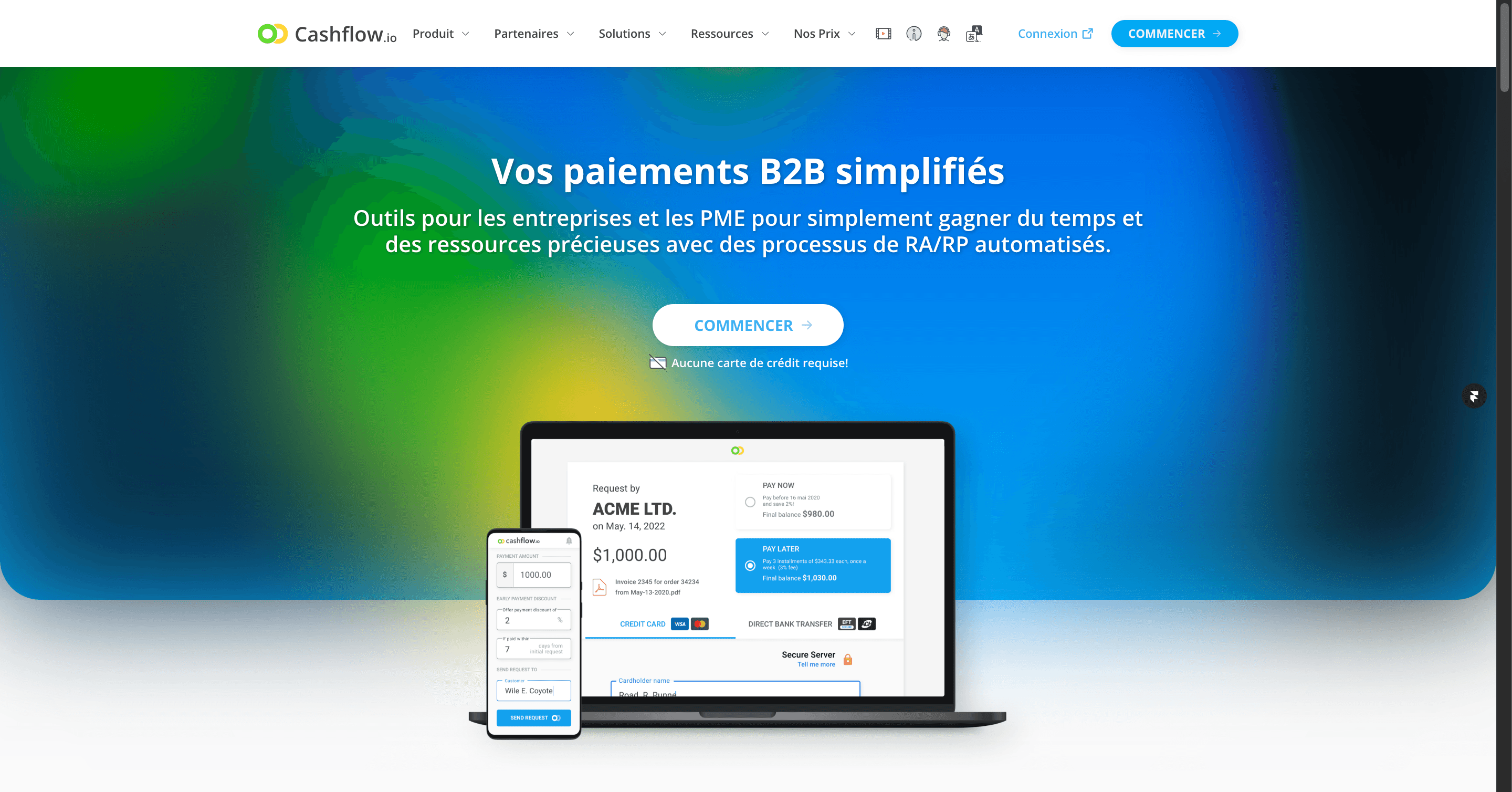As a construction company owner, you know the difficulties of managing cash flow while juggling multiple projects.
Saturday, April 20, 2024
by
Cashflow.io
Delayed payments quickly drain your working capital, making it challenging to take on new jobs or even meet payroll. But there is a solution that allows you to access cash quickly without taking out a loan – construction factoring.
This guide explains what construction factoring is, how it works, its benefits and downsides, and how to choose the best factoring company for your business. Read on to learn how accounts receivable factoring can accelerate your cash flow so you can take on more projects and grow your construction firm.
What Is Construction Factoring?
Construction factoring is a form of financing where you sell your accounts receivable (invoices) to a factoring company to receive upfront cash. The factoring company pays you a percentage of the invoice’s value upfront and then collects payment from your customer later. Once the customer pays in full, the factoring company sends you the remainder minus their fee.
Factoring transfers the risk of nonpayment from your business to the factoring company. Rather than waiting 30, 60, or 90 days for customers to pay invoices, you get immediate cash to cover payroll, buy materials, and take on new business. This improves cash flow and gives you funds to complete jobs without taking on business debt.
Construction factoring is also known as accounts receivable factoring or invoice factoring. It provides a revolving line of credit based on your unpaid invoices, so you get cash as soon as needed. Factoring isn’t a loan, so there’s no debt to pay back if customers don’t pay.
How Construction Factoring Works
Selling your receivables to a factoring company is straightforward and can take a few days to set up. Here are the steps:
Apply with a factoring company. Provide details on your construction business, customers, and typical invoice amounts.
Get approved. The factor reviews your application and approves you for a factoring line of credit.
Sell invoices. Select invoices to sell to the factoring company as soon as they’re issued to customers.
Receive your advance. Typically 80-90% of the invoice total. The funds are deposited in your bank account within 24-48 hours.
Collect the remaining balance. You receive the remainder minus fees when your customer pays the factoring company.
Once set up, you can factor invoices anytime and receive advances quickly. Many contractors use the funds to take on new jobs before previous projects are fully paid. This keeps cash flowing even when customers delay payments.
Advantages of Construction Factoring
Rapid Access to Funds: Immediate cash availability within 24 hours significantly enhances liquidity, supporting day-to-day operational expenses and allowing construction businesses to act swiftly on investment opportunities.
Debt-Free Financing: Avoid the burdens of traditional loans with no monthly repayments. This flexible financing option aligns with business growth, enabling companies to leverage their sales without accumulating more debt.
Effortless Approval Process: Sidestep credit checks and collateral requirements. Startups or businesses with poor credit histories can secure funds if they have reliable customers, promoting financial inclusion and opportunity.
Strengthened Customer Relationships: Accessing funds promptly reduces the necessity of persistent follow-ups for early invoice payments. This fosters smoother relationships with accounts payable teams, enhancing overall business interactions.
Mitigating Project Delays: During project delays caused by unforeseen circumstances, such as adverse weather or permit issues, factoring ensures continuous cash flow to cover ongoing expenses, preventing financial strain.
Catalyst for Business Expansion: Additional capital infusion allows investment in new equipment, recruitment of skilled personnel, and the pursuit of larger projects. This capital injection propels business growth and market competitiveness.
Disadvantages of Construction Factoring
Higher Cost: The cost of factoring, ranging between 1-5% of the invoice amount, is comparatively higher than conventional financing options. Yet, the immediate access to funds often justifies this expense.
Customer Notification: Involving a third party might alert customers to the factoring arrangement, potentially impacting relationships. Some clients may prefer dealing directly with the business and dislike third-party involvement.
Responsibility in Recourse Factoring: The responsibility remains with the business if customers default on payments. Non-recourse factoring shifts this risk to the factoring company but usually comes at a higher cost.
Risk of Over-Reliance: Excessive reliance on factoring might lead to the continuous sale of a significant portion of receivables. This practice could erode long-term profit margins, necessitating careful management of factoring usage.
Get all the Information about Government Factoring
When Construction Factoring Makes Sense
Factoring works best for construction companies that struggle with long periods of negative cash flow and can benefit from instant access to capital. It’s ideal for:
1. Startups
For new construction companies lacking established business credit, factoring offers a lifeline. It provides quick access to much-needed capital, enabling startups to kickstart their operations without the hurdles posed by traditional lending institutions. By leveraging their accounts receivable, startups can bridge financial gaps, fund initial projects, purchase materials, and cover operational costs crucial for growth and sustainability.
2. Businesses with Credit Problems
Factoring is a viable option for construction businesses grappling with credit issues or a history of bankruptcies. Unlike traditional loans, factoring focuses more on the creditworthiness of the business’s customers. This makes it easier for companies with poor credit histories to access funds based on their receivables, circumventing the stringent credit requirements of banks or other financial institutions.
3. Inconsistent Revenue
Construction companies often face irregular cash flows due to the nature of project-based payments. Factoring helps mitigate this inconsistency by providing immediate liquidity against outstanding invoices. By converting unpaid invoices into accessible cash, businesses can smoothen out the peaks and valleys in revenue, ensuring a steady stream of funds to cover ongoing expenses, payroll, and operational needs.
4. Taking on New Jobs
Access to working capital is crucial when bidding for new contracts or projects in the construction industry. Factoring allows businesses to access funds swiftly, providing the financial flexibility to bid competitively on new jobs. With readily available capital, companies can invest in labor, materials, equipment, and other resources to secure and fulfill new contracts.
5. Growing Your Business
For construction firms aiming to expand their operations, factoring is a valuable tool for acquiring additional capital. The injected funds can facilitate business growth by financing the purchase of new equipment, hiring additional employees, expanding infrastructure, or securing more significant workspace.
6. Covering Expenses During Delays
Construction projects often encounter unforeseen delays due to adverse weather conditions, permitting issues, or unexpected setbacks. Factoring provides a financial cushion during these periods, ensuring businesses can continue paying employees, suppliers, and other essential expenses even when faced with project delays. This ability to cover operational costs during downtime helps maintain business continuity and mitigates the impact of unforeseen circumstances on cash flow.
Low Rates
Key Points: Seek competitive rates typically ranging from 1-3% per 30 days, tailored to fit the specific needs of your business.
No Contracts
Key Points: Choose a company that offers flexibility and avoids lengthy commitments to accommodate changing business needs.
Fast Funding
Key Points: Essential for maintaining cash flow, look for companies that disburse funds quickly, within 24-48 hours after invoice submission.
Recourse Factoring
Key Points: Consider the availability of non-recourse factoring to mitigate risks associated with non-payment by clients.
Online Platform
Key Points: An efficient and user-friendly online portal is crucial for managing invoices and tracking transactions seamlessly.
Invoice Flexibility
Key Points: Flexibility to selectively sell invoices as needed allows for better control over which receivables to finance.
Customer Service
Key Points: Reliable and responsive customer support is vital for resolving issues promptly and maintaining operational continuity.
Construction Experience
Key Points: Prior experience with construction businesses indicates a deeper understanding of industry-specific challenges and needs.
1. Low Rates
When considering a construction factoring company, analyzing its fee structures is crucial. Look for competitive rates within the 1-3% range per 30 days. However, rates vary based on factors like your business’s invoice volume, the creditworthiness of your customers, and the industry you operate in.
2. No Contracts
Avoid committing to long-term contracts when selecting a factoring company. Opt for companies that allow flexibility in their agreements, enabling you to discontinue their services without substantial penalties or obligations. This flexibility ensures you can adjust your financial strategies as needed without being tied down by prolonged contractual commitments.
3. Fast Funding
Timely access to funds is pivotal in the construction industry, where cash flow can be unpredictable. Seek a factoring company that prioritizes swift funding, ideally depositing cash within 24 to 48 hours after invoice submission.
4. Recourse Factoring
Opt for non-recourse factoring, especially in the construction sector, where payment uncertainties may arise. With non-recourse factoring, the factoring company assumes the risk of customer non-payment. If a customer fails to pay due to insolvency or other reasons, you are not held responsible, offering financial protection.
5. Online Platform
Efficiency in managing your accounts receivable is essential. Look for a factoring company that provides an accessible online portal. This platform should enable you to submit invoices, track payments, and manage your account effortlessly. A user-friendly interface can streamline your invoicing process and enhance overall convenience.
6. Customer Invoices Flexibility
Flexibility in choosing which invoices to factor is advantageous. Opt for a company that allows you to selectively sell invoices rather than mandating the sale of all invoices. This flexibility permits you to tailor your cash flow needs according to specific projects or situations without being obligated to factor every invoice.
7. Customer Service
Reliable customer support is indispensable when partnering with a factoring company. Prioritize companies that offer responsive and effective customer service. A dedicated support team can address any concerns, resolve issues promptly, and provide guidance on maximizing the benefits of their factoring services.
8. Construction Experience
Selecting a factoring company well-versed in the intricacies of the construction industry can be advantageous. Look for a company with experience working with construction businesses. Familiarity with the unique challenges, billing cycles, and payment intricacies within the construction sector can ensure smoother transactions and a better understanding of your business needs.
Read our blog on Medical Factoring software.
Who are the Biggest Construction Financing Companies in the US?
Cashflow.io – Tailored financial platform for construction businesses, offering customized quotes, mobile payment acceptance, and efficient automated collections. Seamlessly integrates into existing systems while ensuring scalability and compliance with industry standards.
Riviera Finance – Top-rated customer service & true non-recourse. Established in 1969, Riviera Finance offers a high advance rate of 95%, starting discount rates at 2%, with no minimum revenue requirements. They work with contractors like security system installers, aggregate haulers, and more, maintaining over 25 offices across the US and Canada.
SMB Compass – Industry expertise & flexibility. SMB Compass provides up to 97% advance rates, starting discount rates at 1%, requiring at least $10,000 of monthly revenue. Their program supports payroll funding, lien waiver collection, vendor, supplier, subcontractor payments, and more, catering to small general contractors for business expansion.
eCapital – Quickest funding. Offering one of the highest advance rates up to 100%, eCapital provides immediate funding and a revolving line of credit. They maintain a database of over 40,000 companies, providing insight into client backgrounds, with rates and fees determined based on income.
FundThrough – High advance rate & QuickBooks integration. With an advance rate of up to 100%, FundThrough offers quick funding within 24 hours after approval, starting discount rates at 2.5% to 5% per 30 days. They enable seamless invoice uploads or direct QuickBooks integration, focusing on completed construction projects.
Factor Funding Co. – Great for minority-owned businesses. With advance rates between 70% and 95% and discount rates ranging from 0.5% to 3%, Factor Funding Co. caters to small and medium-sized businesses nationwide since 1996. They focus on providing cash flow solutions and emphasize month-to-month contracts.
CapitalPlus – Works with progress billing & performance bonds. CapitalPlus specializes in factoring construction invoices, offering advance rates up to 90% and starting discount rates at 2%. They stand out for their flexibility, allowing businesses to choose which invoices to sell and working with progress billing and performance bonds.
What is the Best Construction Financing Platform in 2024?
Experience streamlined construction financing with Cashflow.io, a versatile financial platform meticulously crafted to manage construction project funds efficiently. It is tailored specifically for construction financing businesses, simplifies financial transactions, and offers bespoke solutions.
Customized Quote Management
Effortlessly customize quotes with varied payment options for your construction business, eliminating manual processes. Cashflow.io enhances efficiency and saves time in handling construction financing details.
Mobile Payment Flexibility On-The-Go
Seamlessly accept mobile payments on-site for construction services, eliminating the hassle of cash or checkbooks. Cashflow.io’s mobile payment feature offers convenience and flexibility to your construction team.
Customer-Centric Flexible Payment Plans
Empower your construction business with flexible customer payment plans, enhancing convenience for customers in paying for In-Field Services. This functionality fosters positive customer experiences, streamlining the payment process in construction financing.
Automated Collection Processes for Efficiency
Ease collection burdens through Cashflow.io’s tailored automated processes for In-Field Services businesses. This automation ensures smoother operations and efficient collection management, reducing manual effort and errors. Additionally, Cashflow.io seamlessly integrates into existing financial systems, supporting construction financing operations. Its scalability perfectly aligns with evolving demands in construction projects, providing enhanced oversight and security while adhering to industry-standard guidelines.
Wrapping Up
Construction factoring serves as a financial buoy for construction companies, alleviating the burdens of cash flow constraints often experienced in the industry. Its rapid access to funds, absence of debt obligations, and ability to streamline payment processes influence a company’s agility in undertaking and completing projects. However, while it significantly mitigates financial hurdles, carefully considering its associated costs, customer perceptions, and over-reliance risk is essential. In the rhythmic dance of finances within the construction realm, Cashflow.io emerges as a top choice for invoice factoring.
FAQ
What is Construction Factoring?
Construction factoring involves selling accounts receivable at a discount to a factoring company, providing immediate cash to construction companies, and managing cash flow during ongoing projects.
How Does Construction Factoring Work?
Construction factoring entails selling invoices to a factoring company at a discount and receiving immediate cash for ongoing projects. The factoring company manages collections from clients.
What types of construction businesses can benefit from factoring?
Construction factoring can benefit various types of construction businesses, including startups, small to large-scale contractors, subcontractors, homebuilders, and commercial construction firms.
How does construction factoring differ from traditional loans for financing construction projects?
Unlike traditional loans, construction factoring doesn’t involve borrowing money. Instead, it involves selling accounts receivable (invoices) to a factoring company to receive immediate cash.
Partner With Cashflow.io
We’re always on the lookout for opportunities to partner with innovators and disruptors.
LEARN MORE














































